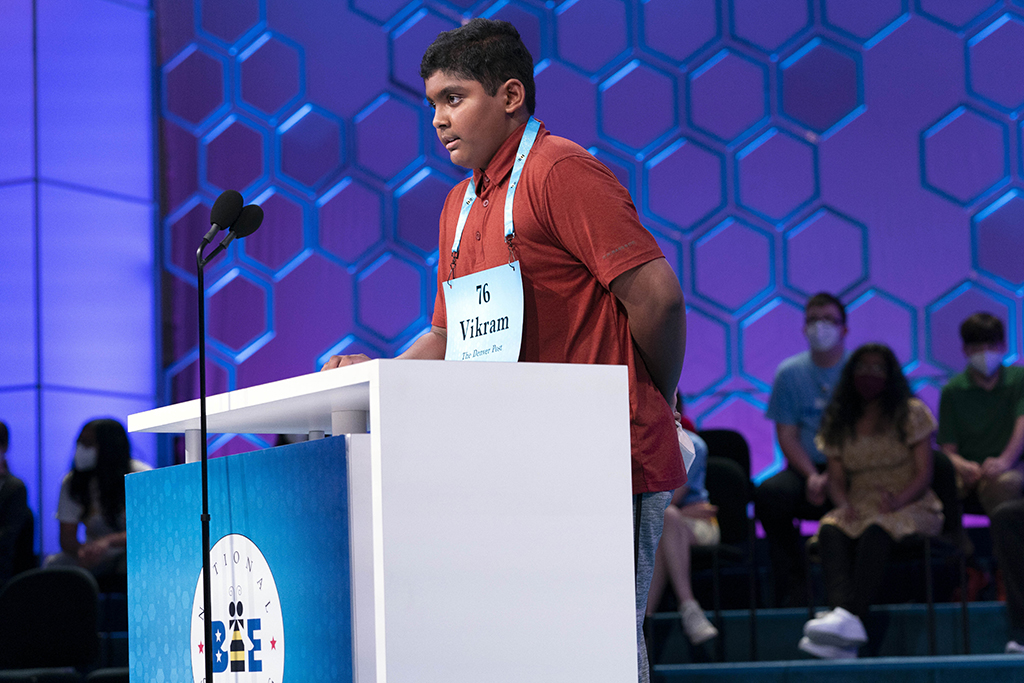
Saharsh Vuppala, 13, from Bellevue, spells his word during the finals of the Scripps National Spelling Bee competition. (AP Photo/Jose Luis Magana)
NATIONAL HARBOR, Md. — A 13-year-old from Bellevue placed fourth in the 2022 Scripps National Spelling Bee on June 2—the best performance by a speller from Washington in more than three decades, on a night that ended with the competition’s first “spell-off.”
Saharsh Vuppala, an eighth-grader at Annie Wright Middle School in Tacoma, correctly spelled “Clitocybe”—a genus of mushrooms—in the first round of the finals to advance to a multiple-choice stage that required spellers to identify a word’s meaning. That vocabulary round, which knocked out half of the eight contestants still standing, was part of an increased emphasis on not only spelling words, but defining them.

Harini Logan, 14, from San Antonio, Texas, holds the winning trophy as she is surrounded by her family. (AP Photo/Jose Luis Magana)
Harini Logan of San Antonio, 14, spelled 21 words correctly to emerge as the champion, beating Vikram Raju in a marathon, first-of-its-kind spell-off, a format that tested the contestants on how many words they could correctly spell within 90 seconds. The top two finishers’ unexpected struggles began when Raju misspelled “Senijextee,” one of several alternate spellings of Sinixt, an Indigenous people from modern-day Washington and British Columbia who are one of the 12 bands of the Colville Confederated Tribes. Spellers rely on a word’s origin to discern its spelling, but the Bee’s pronouncers told Raju the Merriam-Webster Dictionary listed no origin for Senijextee, which comes from a Salish dialect.
Vuppala, who finished in a tie for 51st place as a fifth-grader in the 2019 Bee, placed higher than any Washingtonian since Amy Marie Dimak of Seattle triumphed in 1990 by spelling “fibranne,” a type of fabric made from rayon.
According to Bee organizers, no speller from Washington had made it to the finals since at least 2016.
The Bee’s winner earns $50,000. The runner-up receives $25,000, and Vuppala will win $10,000 for finishing fourth.

Vikram Raju, 12, from Aurora, Colo., spells his word during the finals of the Scripps National Spelling Bee competition, on Thursday, June 2, 2022, in Oxon Hill, Md. (AP Photo/Jose Luis Magana)
Thirteen finalists began the night’s competition, but the vocabulary round—added in 2021 to test increasingly sophisticated spellers—tripped up some of the favorites to win the event.
Scott Remer—who coached three of the 13 finalists, including Vuppala—said the new emphasis on word meanings makes it harder to give contestants a balanced set of questions and gives an advantage to older spellers who have been exposed to more words in context over time.
“It’s sort of a spelling and vocab bee now; it’s not really a spelling bee,” said Remer, who was a finalist in the 2008 Bee and has since authored multiple books on the competition. “I just think that it sort of does the competition a disservice.”

Vihaan Sibal, 13, from McGregor, Texas, spells his word during the finals of the Scripps National Spelling Bee competition, on Thursday, June 2, 2022, in Oxon Hill, Md. (AP Photo/Jose Luis Magana)
Vuppala’s twin sister, Deetya, was also eliminated by a vocabulary round in the semifinals without misspelling a single word. In a taped segment shown during the program, Vuppala said it was hard not having her in the finals with him.

Harini Logan, 14, from San Antonio, Texas, holds high her Scripps National Spelling Bee trophy as he father Logan Anjaneyulu looks on, Thursday, June 2, 2022, in Oxon Hill, Md. (AP Photo/Jose Luis Magana)
“It feels really great to be in the finals of the Bee, but I’m also really sad my sister isn’t there,” he told the Spokesman-Review. “I’m representing Washington and I’m also representing me and my sister.”
Their mother, Mayura Vuchuru, said Saharsh and Deetya supported and challenged each other to become two of the nation’s most elite spellers.
“It’s hard for Deetya, because she worked hard and she is equally capable,” Vuchuru said. “Sometimes it’s just luck, too, in the word you get.”
Past champions won with far easier words, including “therapy” in 1940, “croissant” in 1970, and “luge” in 1984.
But Remer said spelling is about more than rote memorization.
“It encourages a love of languages,” he said. “It encourages an appreciation of different cultures and of nuance and sophistication.”



